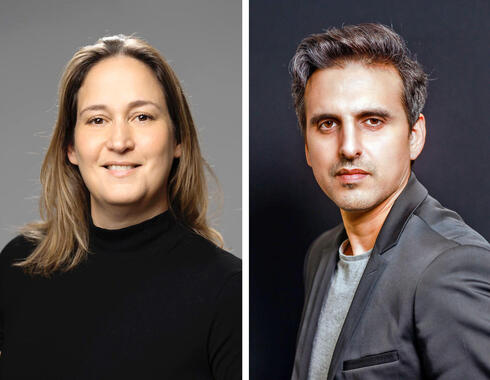
“We are constantly looking for growing foodtech companies and to bring their potential to Israel and the world"
Shay Cohen, Managing Director at Tnuva's corporate venture capital fund Tnuva Ventures, and Pnina Sverdlov, Tnuva’s Chief R&D Officer, spoke with Calcalist ahead of this week’s Future Food-Tech conference in San Francisco, which will deal with the challenges facing the foodtech world in the areas of investments, R&D and commercialization
Nestlé, Unilever, Mars, Hershey, and General Mills, are just some of the hundreds of exhibitors at the annual Future Food-Tech conference that will be held this week in San Francisco. The conference attracts participants from 42 countries from across the global food industry, including investors, startups, corporations, and government representatives to discuss the innovations and trends in foodtech. Dozens of startups and Israeli companies will also come to the conference this year.
Before the conference, Calcalist spoke with Shay Cohen, Chief Innovation Officer of the Tnuva, who is the Managing Director of the corporate venture capital fund Tnuva Ventures, and with Pnina Sverdlov, Chief R&D Officer of the group. This year, the two will lead a roundtable discussion at the conference titled: "From Initial Commercialization to Growth: Partnerships Models Between Mature Food-Tech Companies & Corporates”, which refers to one of the crucial aspects in the development of the foodtech industry.
"As the foodtech industry continues to grow and mature, foodtech companies and established corporations will have to develop models of close partnership, so that together they can ensure real growth and consumer accessibility,” Cohen said. “We learned this during the collaboration between corporations like ours and companies that are really close to scale. That's where the magic happens - where we give a power multiplier to both parties. The trick is to meet in the right place and find the right business model. We are constantly looking for growing foodtech companies, to bring this potential to the edge in Israel and in the world."
"At Tnuva Ventures we have learned to separate the investment strategy of the fund from the strategic needs of the group. We work in the structure of a fund in every aspect but with an infinite foodtech platform at our disposal. Behind us we have knowledge, experience and content experts in every field (from smart industry and supply chain technologies, to all sub-segments in the foodtech field, including packaging technologies, regulation and groundbreaking components). The fund's investment committee includes managers of the largest business divisions in the economy, who know how to identify a financial investment that will succeed and build strong teams. We place great importance on the team, people and their business maturity, and their ability to be balanced and supervised in the techno-economic game," said Cohen.
Creating a holistic strategy of investments, open innovation, R&D and commercialization is full of tension and challenges. Tnuva learned to categorize the different opportunities very realistically in the initial stages, which allows the company to manage expectations with its partners. According to Sverdlov: "Sometimes the transition from the laboratory stage to production and industrial integration at high scales is accompanied by many difficulties and challenges. At the Tnuva R&D center we meet many innovative and creative technologies. The R&D center has dozens of food technologists, engineers, laboratory workers, regulation and project managers, who manage the development of the product from the concept stage to launch. This is a unique center in the country in terms of its capabilities and the extensive experience gained over decades. The joint work with the startup from the first stages allows us to give feedback already in the early stages and direct the solutions so that they can experience optimal integration in the industry.
"Tnuva allows them to test, through the R&D center and its dedicated pilot equipment, the combination of their components, to give them feedback already in the early stages of their development and helps them improve and speed up development processes in a significant way. Since this is a pilot facility, Tnuva has the flexibility and ability to test every component and raw material," Sverdlov added.
The conference in San Francisco will cover a wide range of topics related to the future of food and the development of foodtech, including plant and alternative proteins, reducing food waste, smart and sustainable packaging, and more. Calcalist asked Cohen and Sverdlov about what future trends we as consumers should look forward to.
“According to GFI and Leumi Partners data, Israel is second only to the U.S. in terms of investments in alternative protein technologies," said Cohen. "The Israeli foodtech industry raised over $1.5 billion between 2014 and 2020. Tnuva was a key player in the growth and in the development of alternative protein sources, such as cultured and plant-based meat products, which align with the growing demand for sustainable and ethical food options. The company's entry into the cultured meat market in 2020 illustrates its commitment to innovation and its desire to stay ahead of the curve in the evolving foodtech landscape.”
According to Cohen: "There are three major trends in the field of food technology that are appropriate to focus on and invest in for the near future. The first is the field of protein substitutes. In this field, we are focusing on enabling technologies for the production methods of tomorrow, in the field of precise fermentation and cellular agriculture. These are fields in which Israel is a world leader.”
"Another important issue,” Sverdlov adds, “is the change in raw materials in the food industry. The significant leap made by research and development companies in the field of plant proteins was caused by innovative ingredients that also contributed to the transition of consumers (who are not vegan) to the consumption of the category, also thanks to our ability to develop products with excellent taste, nutritional values and an accessible price. Companies like Tnuva, with supply chain and production processes, should make use of the same raw materials to allow more consumers to consume products that are substitutes."
Another trend according to Cohen, "is personalized nutrition, which is a growing trend in the world. At Tnuva we have also identified the trend and we are launching products for designated audiences such as the elderly population, those engaged in sports, and more. We invest in startups that offer solutions of supplements and enrichments for different groups of the population. This can include developing personalized meal plans and offering nutritional advice to help consumers achieve their goals. We are actively and continuously looking at the company to invest in additional areas, and in technologies that optimize production and reduce waste, such as precision agriculture, data analysis, as well as smart packaging that allows for a long shelf life, better preservation and improved safety of food products. These initiatives generate innovation alongside corporate responsibility, and they fit into Tnuva's broader goals to reduce the environmental impact of food production," noted Sverdlov.
When Sverdlov is asked about the future, she claims that the evolution of food will take us to places we never imagined and our future protein sources will be much more diverse. "Our children's plate will look different from ours today. In the future, we will see more plant-based protein products such as tofu, algae and mushrooms, as well as a combination of cultured ingredients, which today still seem like science fiction."
First published: 09:00, 15.03.23














